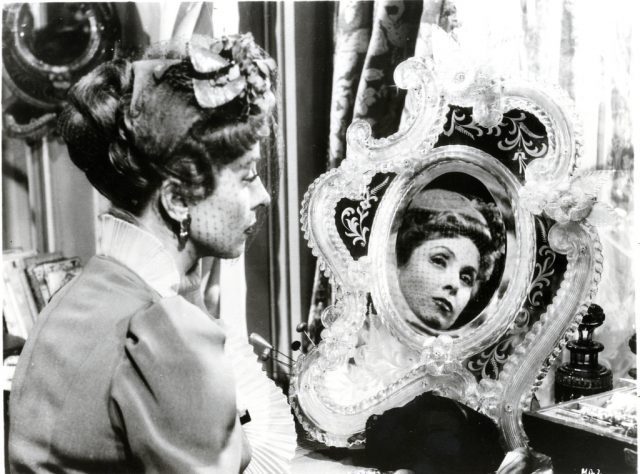
The Comtesse Louise de . . . (Danielle Darrieux) reflects on her life in The Earrings of Madame De . . .
THE EARRINGS OF MADAME DE . . . (Max Ophüls, 1953)
French Institute Alliance Française, Florence Gould Hall
55 East 59th St. between Madison & Park Aves.
Tuesday, March 15, $14, 4:00 & 7:30
Series continues Tuesday nights through March 29
212-355-6100
fiaf.org
Max Ophüls’s The Earrings of Madame de . . . (also known as just Madame de . . .) is a marvelously told tale, a majestic cinematic achievement that Andrew Sarris considered the greatest movie ever made and Dave Kehr called “one of the most beautiful things ever created by human hands.” In 1950, the German-born auteur made La Ronde, a merry-go-round of romance in which one of the two lovers from one scene moves on to someone else in the next. Three years later, Ophüls again follows a series of current, past, and potential lovers in The Earrings of Madame de . . . , but this time via a pair of diamond earrings whose meaning and importance are altered every time they change hands. The film opens with the Comtesse Louise de . . . (a radiant Danielle Darrieux) looking through her personal possessions, from jewelry to furs to a Bible. During a two-minute continuous shot with a handheld camera, Ophüls shows only her hands and the side of her face until she sits down and looks at herself in the mirror; it not only immediately establishes the woman’s character — like her fancy things, she has become merely another object, an empty reflection — but lets the audience know that they are in the grip of a master, that the very motion of the camera itself will play a central role in what we’re about to experience.
And indeed, Christian Matras’s gorgeous black-and-white cinematography, composed of wonderfully orchestrated close-ups and sweeping montages, guides us along as we follow the travels of a pair of diamond earrings that, through various circumstances, keeps coming back to the countess. Louise, whose last name we never learn through clever blocks made in sound and image, needs money, but she is afraid to let her husband, Général Andre de . . . (a stern Charles Boyer), know. She decides to sell the diamond earrings he gave her as a wedding present — she not only wants the cash but also is seeking to rid herself of what the jewelry represents, a love that is not what it once was. Meanwhile, her husband is saying goodbye to his lover, Lola (Lia Di Leo), shipping her off to Constantinople as if she were a piece of jewelry he no longer requires. But when Louise’s playful flirtation with the graceful Italian diplomat Baron Fabrizio Donati (Neorealist director Vittorio De Sica) threatens to become more serious, Andre gets more serious as well, and the heart-wrenching melodrama reaches epic dilemmas.
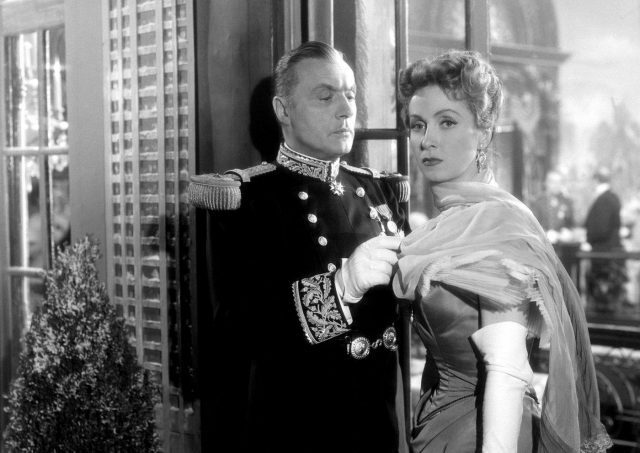
Général Andre (Charles Boyer) takes a newfound interest in his wife (Danielle Darrieux) in Max Ophüls classic
Loosely adapted by Ophüls with Marcel Achard and Annette Wademant from the novel by Louise Lévêque de Vilmorin, The Earrings of Madame de . . . is a ravishing film, every moment a gem. Darrieux, who also appeared in Ophüls’s House of Pleasure and La Ronde and only passed away this past fall at the age of one hundred, is bewitching as the countess, a long-unsatisfied woman attempting to break out of the shell she has been held captive in. Boyer, who had previously starred in Anatole Litvak’s Mayerling with Darrieux, is beguiling as the general, a proud man who is protective of certain possessions. And De Sica, who appeared in more than 150 films but is best known as the director of such Italian stalwarts as The Bicycle Thieves, Umberto D., and Miracle in Milan, is enchanting as the baron, who has fallen passionately in love with Louise and doesn’t care who knows it. Their courtship is breathlessly depicted in a whirling, swirling series of dances at various balls where they are the last to leave. James Mason, who starred in Ophüls’s Caught and Letters from an Unknown Woman, famously wrote, “A shot that does not call for tracks / Is agony for poor old Max, / Who, separated from his dolly, / Is wrapped in deepest melancholy. / Once, when they took away his crane, / I thought he’d never smile again.” Ophüls, who died in 1957 at the age of fifty-four during the making of Les Amants de Montparnasse, goes all out in The Earrings of Madame de . . . , an unforgettable movie with a spectacular ending.
The film is screening March 15 at 4:00 and 7:30 in the FIAF series “Our Love Affairs: Arnaud Desplechin Selects,” comprising five films that have influenced and inspired the French auteur (Kings and Queen, A Christmas Tale). Desplechin says about Madame de . . . , “Danielle Darrieux suffocates under the obligations of marriage. Infidelity will be the risky path she takes to remember herself. And, following along through the film on this journey of a gem, we encounter the twists and turns of desire.” The festival continues March 22 with Ingmar Bergman’s The Touch and concludes March 29 with Martin Scorsese’s The Age of Innocence; Desplechin will provide video introductions for each film.
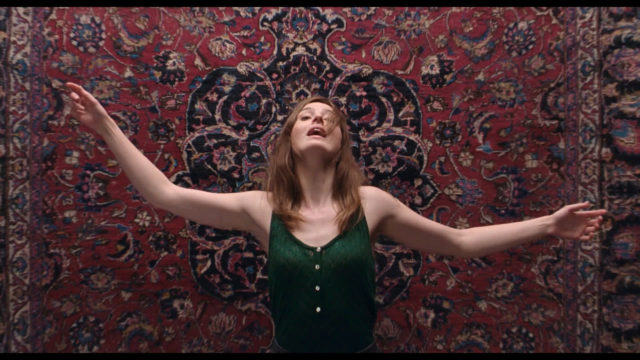
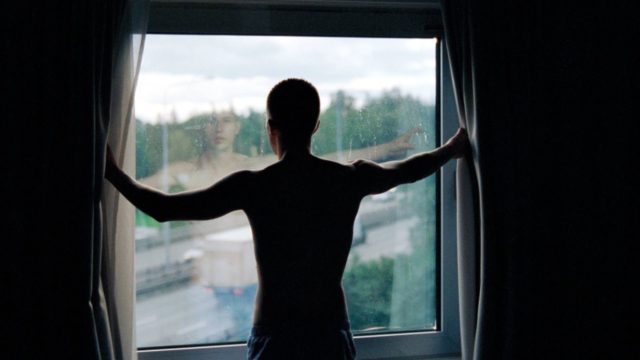
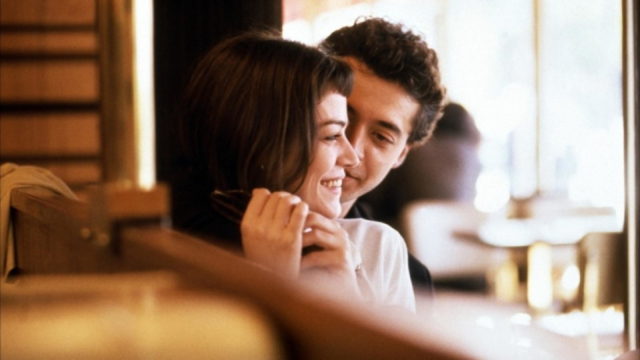
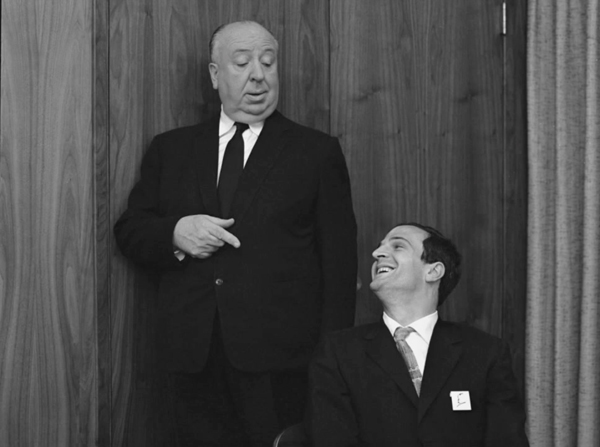
 Founded in 2008 by Charles S. Cohen, the Cohen Media Group is an independent theatrical production and distribution company that specializes in high-quality new films and restorations of classic cinema. The Quad is paying tribute to the group’s first decade of operation with the twenty-two-film series “A Journey Through Cinema: Ten Years of the Cohen Media Group,” continuing through January 25. On January 22 at 5:00, the Quad is screening the widely praised 2015 CMG documentary Hitchcock/Truffaut. “In 1962, while in New York to present Jules and Jim, I noticed that every journalist asked me the same question: ‘Why do the critics of Cahiers du Cinéma take Hitchcock so seriously? He’s rich and successful, but his movies have no substance,’” French Nouvelle Vague auteur François Truffaut wrote in the preface to the second edition of what he called “the hitchbook,” the seminal film bible Truffaut/Hitchcock. “In the course of an interview during which I praised Rear Window to the skies, an American critic surprised me by commenting, ‘You love Rear Window because, as a stranger to New York, you know nothing about Greenwich Village.’ To this absurd statement, I replied, ‘Rear Window is not about Greenwich Village, it is a film about cinema, and I do know cinema.’” Truffaut was determined to change the prevailing belief that British director Alfred Hitchcock was a maker of studio fluff. “In examining his films,” Truffaut continued, “it was obvious that he had given more thought to the potential of his art than any of his colleagues. It occurred to me that if he would, for the first time, agree to respond seriously to a systematic questionnaire, the resulting document might modify the American critics’ approach to Hitchcock. That is what this book is all about.” The tome compiled a weeklong series of conversations between the thirty-year-old Truffaut and the sixty-three-year-old Hitchcock — the talks began on Hitch’s birthday — in the latter’s Hollywood studio office, with Helen Scott serving as translator. Although the interviews were recorded for audio, no film was shot; instead, Philippe Halsman took still photos. The story of the unique relationship between Truffaut, who as of 1962 had made only The 400 Blows and Shoot the Piano Player (he was in the midst of finalizing Jules and Jim), and Hitchcock, who was preparing his forty-eighth film, The Birds, is told in this splendid documentary, which cleverly reverses the order of Hitchcock and Truffaut’s names from the book it’s based on. Writer-director Kent Jones (head of the New York Film Festival), cowriter Serge Toubiana (former editor in chief of Cahiers du Cinéma) and editor Rachel Reichman lovingly combine Halsman’s pictures, audio clips from the original sessions, scenes from many of Hitchcock’s films (and a few of Truffaut’s), close-ups of dozens of pages from the book, rare archival footage, and new interviews with ten directors from around the world who weigh in on what makes Hitchcock’s work so special, so illuminating, so influential.
Founded in 2008 by Charles S. Cohen, the Cohen Media Group is an independent theatrical production and distribution company that specializes in high-quality new films and restorations of classic cinema. The Quad is paying tribute to the group’s first decade of operation with the twenty-two-film series “A Journey Through Cinema: Ten Years of the Cohen Media Group,” continuing through January 25. On January 22 at 5:00, the Quad is screening the widely praised 2015 CMG documentary Hitchcock/Truffaut. “In 1962, while in New York to present Jules and Jim, I noticed that every journalist asked me the same question: ‘Why do the critics of Cahiers du Cinéma take Hitchcock so seriously? He’s rich and successful, but his movies have no substance,’” French Nouvelle Vague auteur François Truffaut wrote in the preface to the second edition of what he called “the hitchbook,” the seminal film bible Truffaut/Hitchcock. “In the course of an interview during which I praised Rear Window to the skies, an American critic surprised me by commenting, ‘You love Rear Window because, as a stranger to New York, you know nothing about Greenwich Village.’ To this absurd statement, I replied, ‘Rear Window is not about Greenwich Village, it is a film about cinema, and I do know cinema.’” Truffaut was determined to change the prevailing belief that British director Alfred Hitchcock was a maker of studio fluff. “In examining his films,” Truffaut continued, “it was obvious that he had given more thought to the potential of his art than any of his colleagues. It occurred to me that if he would, for the first time, agree to respond seriously to a systematic questionnaire, the resulting document might modify the American critics’ approach to Hitchcock. That is what this book is all about.” The tome compiled a weeklong series of conversations between the thirty-year-old Truffaut and the sixty-three-year-old Hitchcock — the talks began on Hitch’s birthday — in the latter’s Hollywood studio office, with Helen Scott serving as translator. Although the interviews were recorded for audio, no film was shot; instead, Philippe Halsman took still photos. The story of the unique relationship between Truffaut, who as of 1962 had made only The 400 Blows and Shoot the Piano Player (he was in the midst of finalizing Jules and Jim), and Hitchcock, who was preparing his forty-eighth film, The Birds, is told in this splendid documentary, which cleverly reverses the order of Hitchcock and Truffaut’s names from the book it’s based on. Writer-director Kent Jones (head of the New York Film Festival), cowriter Serge Toubiana (former editor in chief of Cahiers du Cinéma) and editor Rachel Reichman lovingly combine Halsman’s pictures, audio clips from the original sessions, scenes from many of Hitchcock’s films (and a few of Truffaut’s), close-ups of dozens of pages from the book, rare archival footage, and new interviews with ten directors from around the world who weigh in on what makes Hitchcock’s work so special, so illuminating, so influential.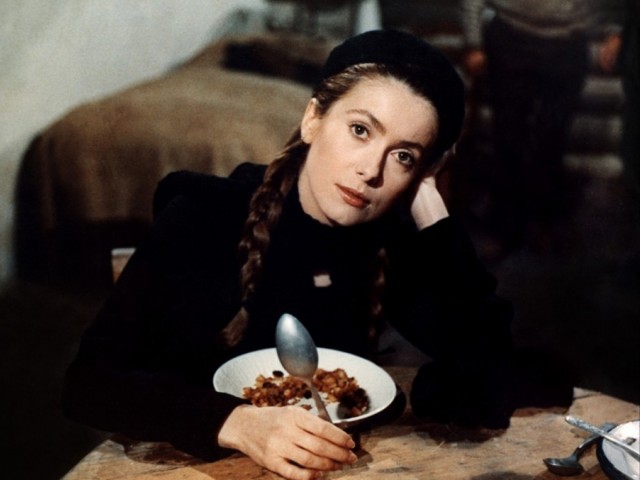
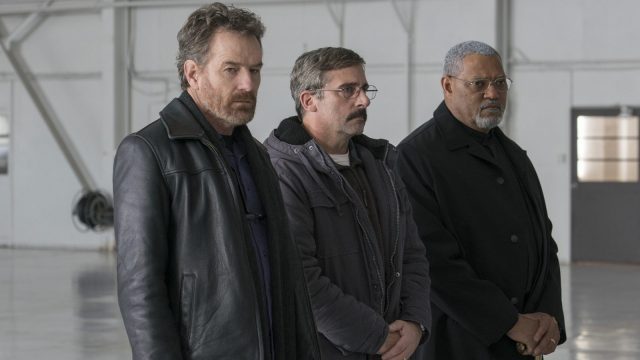
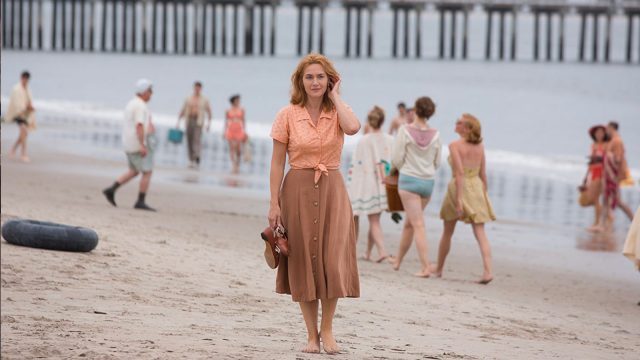
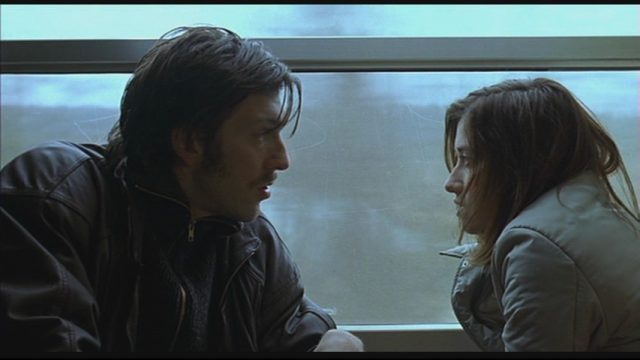
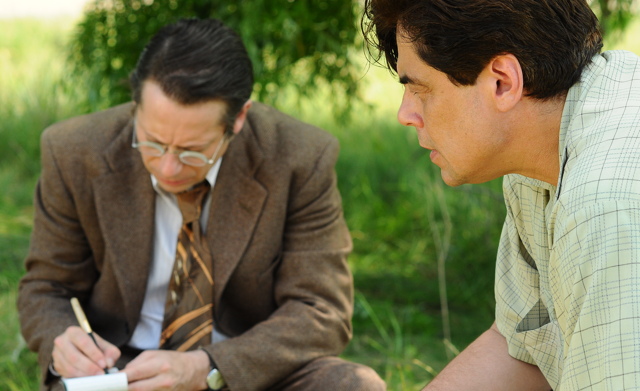
 Based on a true story documented in Georges Devereux’s 1951 book, Reality and Dream: Psychotherapy of a Plains Indian, which features an introduction by Margaret Mead, Palme d’Or nominee Jimmy P. details the fascinating relationship between French-Hungarian ethnologist, anthropologist, and psychoanalyst Devereux (Mathieu Amalric) and Native American Blackfoot James Picard (Benicio del Toro). A WWII veteran living in Montana in 1948, Picard is taken to Topeka Winter Hospital after suffering from debilitating headaches and temporary blindness. When doctors Menninger (Larry Pine), Holt (Joseph Cross), Braatoy (Ricky Wayne), and Jokl (Elya Baskin) can’t find anything physically wrong with Picard — and wonder whether their unfamiliarity with Indians is limiting their understanding of his problems — Menninger calls in his colleague Devereux, a Freudian who is having difficulty getting a full-time position because of some of the unusual methods he employs. An excited Devereux immerses himself in Picard’s case, getting the direct, not-very-talkative Blackfoot to soon start opening up about his personal life, share his dreams, and discuss his military experiences. While the other doctors disagree with one another on what Devereux is doing, he and Jimmy develop a unique friendship, two very different men trying to find their place in life. Director Arnaud Desplechin wrote the screenplay (with Julie Peyr and Kent Jones) specifically for Amalric and del Toro, and it’s a terrific pairing, the former, who has previously starred in Desplechin’s A Christmas Tale, My Sex Life . . . or How I Got Into an Argument, and Kings and Queen, playing Devereux with a childlike, wide-eyed wonder, the latter portraying Jimmy with dark, brooding, penetrating eyes while also exuding an inner peace and poetry. The film slows down and gets off track when it strays from its main storyline, particularly when Devereux is visited by his married girlfriend, Madeleine (Gina McKee), and the reenacted dream sequences and past memories are hit or miss, some boasting a surreal beauty, others unnecessarily confusing, but when Amalric (The Diving Bell and the Butterfly) and del Toro (Traffic) are on-screen together, Jimmy P. is mesmerizing. Jimmy P.: Psychotherapy of a Plains Indian is screening March 13 & 16 in the Film Society of Lincoln Center series “Golden Days: The Films of Arnaud Desplechin,” a weeklong retrospective celebrating the March 18 release of Desplechin’s latest film, My Golden Days. Running March 11-17, the festival features such other films as The Sentinel, La vie des morts (which Desplechin will introduce on March 15),
Based on a true story documented in Georges Devereux’s 1951 book, Reality and Dream: Psychotherapy of a Plains Indian, which features an introduction by Margaret Mead, Palme d’Or nominee Jimmy P. details the fascinating relationship between French-Hungarian ethnologist, anthropologist, and psychoanalyst Devereux (Mathieu Amalric) and Native American Blackfoot James Picard (Benicio del Toro). A WWII veteran living in Montana in 1948, Picard is taken to Topeka Winter Hospital after suffering from debilitating headaches and temporary blindness. When doctors Menninger (Larry Pine), Holt (Joseph Cross), Braatoy (Ricky Wayne), and Jokl (Elya Baskin) can’t find anything physically wrong with Picard — and wonder whether their unfamiliarity with Indians is limiting their understanding of his problems — Menninger calls in his colleague Devereux, a Freudian who is having difficulty getting a full-time position because of some of the unusual methods he employs. An excited Devereux immerses himself in Picard’s case, getting the direct, not-very-talkative Blackfoot to soon start opening up about his personal life, share his dreams, and discuss his military experiences. While the other doctors disagree with one another on what Devereux is doing, he and Jimmy develop a unique friendship, two very different men trying to find their place in life. Director Arnaud Desplechin wrote the screenplay (with Julie Peyr and Kent Jones) specifically for Amalric and del Toro, and it’s a terrific pairing, the former, who has previously starred in Desplechin’s A Christmas Tale, My Sex Life . . . or How I Got Into an Argument, and Kings and Queen, playing Devereux with a childlike, wide-eyed wonder, the latter portraying Jimmy with dark, brooding, penetrating eyes while also exuding an inner peace and poetry. The film slows down and gets off track when it strays from its main storyline, particularly when Devereux is visited by his married girlfriend, Madeleine (Gina McKee), and the reenacted dream sequences and past memories are hit or miss, some boasting a surreal beauty, others unnecessarily confusing, but when Amalric (The Diving Bell and the Butterfly) and del Toro (Traffic) are on-screen together, Jimmy P. is mesmerizing. Jimmy P.: Psychotherapy of a Plains Indian is screening March 13 & 16 in the Film Society of Lincoln Center series “Golden Days: The Films of Arnaud Desplechin,” a weeklong retrospective celebrating the March 18 release of Desplechin’s latest film, My Golden Days. Running March 11-17, the festival features such other films as The Sentinel, La vie des morts (which Desplechin will introduce on March 15), 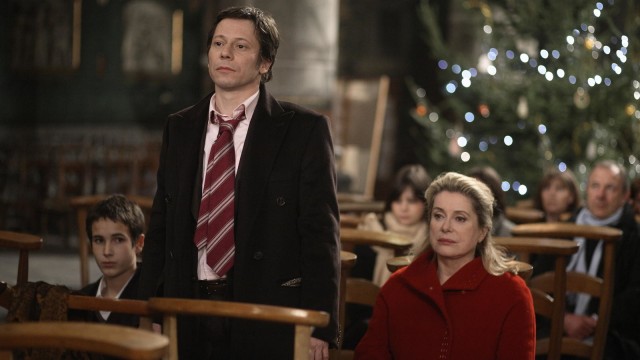
 One of the best films of 2008, A Christmas Tale is yet another extraordinary work from French post-New Wave filmmaker Arnaud Desplechin (La Sentinelle, Esther Kahn). Desplechin, who examined family dysfunction in the masterful
One of the best films of 2008, A Christmas Tale is yet another extraordinary work from French post-New Wave filmmaker Arnaud Desplechin (La Sentinelle, Esther Kahn). Desplechin, who examined family dysfunction in the masterful